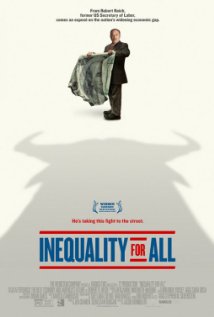
Main Page
Interviews Menu
Alphabetical Menu
Chronological Menu

RADiUS-TWC releases Inequality For All at Lincoln Plaza Cinemas and Angelika Film Center on September 27th, 2013. NYC MOVIE GURU: How did you find the right balance between entertaining the audience, provoking them emotionally and intellectually? Jacob Kornbluth: That was the challenge. You tell people that you're going to make a film about inequality, and a lot of them don't get that excited about it to go out on a Friday night. It makes them feel like they're taking their medicine. When you sit down and watch this movie, it's funny, entertaining and emotional. After the first screening at Sundance, we got a standing ovation and the first question was from a woman who said,"I can't believe I cried and laughed at a movie that I thought was about economics," and I thought to myself that we acheived what we set out to do. I don't believe in didactic storytelling. Those aren't the kind of movies that I would go to see personally, and I wouldn't want to make one like that. I wanted it to be a good cinematic experience. I consider going to the movies a transformation machine---and that means travelling on an emotional journey; it's not about giving people charts and statistics. Even though there are charts, graphics and statistics in the movie, it was important to me that no number got into the movie that didn't have an emotional connection to it. It had to be like a character in the film. I spent an incredible amount of time of the graphics to make sure that they weren't wonky---I'm not economist and I get bored when people show me too many charts. NYC MOVIE GURU: How challenging was it to find the right editor to work with? How was the process to edit the film down from 550 hours of footage to 85 minutes? JK: One of the great things about working on Inequality For All was collaborating with brilliant artists. Kim Roberts was the editor and she also cut a movie called Food, Inc.. I knew her work from Daughter from Danang which I thought was really beautiful. She's as responsible for the film as I am. She's a great storyteller. She, producers Sebastian Dungan and Jennifer Chaiken, Brian Oakes (who did the graphics) and I worked intensively to figure out how to tell this story. The editing process was around 9 months. It was an intense, drawn-out, long-term relationship. It really felt like a collaboration. It was a lot of fun. I've made fiction films before, Haiku Tunnel, and that's just a different process. Non-fiction filmmaking is like a marathon instead of a sprint, in a way, when it comes to the filmmaking process. NYC MOVIE GURU: What kind of changes would you make to banking regulations if you could? JK: The way that a poor or middle class person stores their money should not be the same place as a casino, a.k.a. the stock market; it should be separate. In the middle part of the past Century, it was a very boring job to be a banker. As income and inequality widen, in the 20's and then in late mid-70's until today, you see that the banking sector gets bigger in both eras. We track income inequality in the movie and it looks like a suspension bridge. That same graph tracks the money that's in the financial sector. When people are transacting money for a living without making payments, that has a negative effect on the economy. So, the way to fix that is to reinstate the Glass-Steagall Act in order to separate commercial and investment banking. NYC MOVIE GURU: What got you interested in the topic of economics to begin with? What kind of research did you do? JK: I knew nothing about economics. I never read the Financial pages; it was boring. I thought to myself, "I'm 40 years old. My whole life has been defined by this widening gap between the rich and everyone else. I've also been politically cynical---I wasn't invested in politics and didn't care about economics." After a year of reading about economics, I was still overwhelmed and terrified, but I felt that that was a good thing. The fact that I was a lay person gave me a perspective that was necessary to make a film like this. I'm personally very bad at managing my own finances and would never be interested in hearing the guys in suits talking about economic issues. It turns out that every should and could "get" this stuff. This is a story of my life and our times. People like me and you have to "get" it. We're only going to "get" it if it's a compelling story that's fun to watch and that takes you on an emotional story. By understanding this and overcoming the hurdles that I got overcame, we can take back our democracy. One of my biggest frustrations with talking heads on TV is that, generally, they make it seem like they're smarter than me in some way. I'm proud of the fact that this is a smart movie, but it doesn't make anyone feel like it's too tough for them to understand. Everybody can "get" it. Main Page Interviews Menu Alphabetical Menu Chronological Menu ______________________________________________________ |
The NYC Movie Guru
themovieguru101@yahoo.com
Privacy Policy